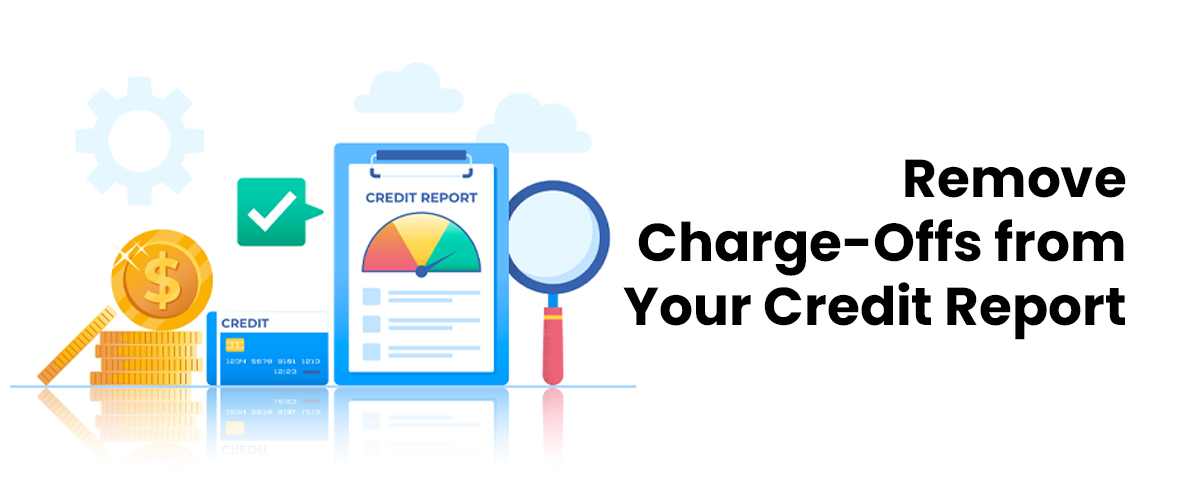What Is a Charge-Off and How Does It Impact Your Credit?
A charge-off happens when a creditor classifies a debt as a financial loss after you’ve missed payments for 180 days or more. Although the creditor considers it uncollectible, you still owe the balance—and the charge-off shows up as a serious negative mark on your credit report.
How a Charge-Off Affects Your Credit Score
Charge-offs can have a significant effect on your credit profile:
1. Credit Score Drop
A charge-off can lower your credit score by 50 to 150 points, depending on your history.
2. Loan Approval Challenges
Lenders often reject applications when they see a charge-off on your report.
3. Higher Interest Rates
If approved, you’ll likely pay much higher interest rates due to perceived risk.
4. Clearance and Employment Issues
Government and military job approvals may be denied because of charge-offs.
Since charge-offs remain on your credit report for 7 years, removing or resolving them early leads to faster recovery.
How to Remove a Charge-Off from Your Credit Report
You have legal options to remove or reduce the impact of a charge-off. Let’s walk through them:
Step 1: Dispute Inaccurate or Unverifiable Charge-Offs
Under the Fair Credit Reporting Act (FCRA), you can dispute any charge-off that is:
-
Incorrect – Includes wrong account details, balance, or dates.
-
Outdated – Must be removed after 7 years from the original delinquency date.
-
Unverifiable – If the creditor cannot validate the entry, it must be deleted.
How to proceed:
- Get a free copy of your report at AnnualCreditReport.com.
- Review it for inaccurate charge-off entries.
- Write dispute letters to Experian, Equifax, and TransUnion.
- If the creditor fails to verify the charge-off, it must be removed.
Note: Creditors often sell charge-off accounts to collection agencies, making documentation harder to track.
Step 2: Negotiate a Pay-for-Delete Agreement
Paying a charge-off doesn’t automatically remove it. However, some creditors may agree to delete it if you settle the balance.
- Contact the original creditor and propose a pay-for-delete arrangement.
- Offer a lump-sum or reduced settlement in exchange for deletion.
- Get the agreement in writing before you make any payment.
While some creditors deny such requests, others may accept if you present a reasonable offer.
Step 3: Settle the Charge-Off for “Paid in Full” Status
Even if you can’t remove the charge-off, having it marked “Paid in Full” is better than leaving it unpaid.
-
Negotiate a lower payoff amount with the creditor.
-
Ensure the account is updated to reflect a “Paid in Full” status.
-
Request a confirmation letter before sending payment.
This status looks better to future lenders than “Settled” or “Unpaid.”
Step 4: Wait for the Charge-Off to Expire
If the charge-off is already several years old, waiting might be the best option:
-
Charge-offs automatically fall off after 7 years from the delinquency date.
-
As they age, they affect your credit score less and less.
However, keep an eye on accuracy. If anything seems off, dispute it—even if the clock is running out.
How Long Do Charge-Offs Stay on Your Credit Report?
| Charge-Off Type | Duration on Report |
|---|---|
| Unpaid Charge-Off | 7 years from the original delinquency date |
| Settled Charge-Off | 7 years, but appears slightly better |
| Paid-in-Full Charge-Off | 7 years, but more favorable to lenders |
Removing or updating these accounts early helps you rebuild credit faster.
How Credit1Solutions.com Helps Remove Charge-Offs Faster
We work with clients to legally fix charge-offs and restore credit health:
- We identify and dispute inaccurate or unverifiable entries.
- We negotiate with creditors for charge-off deletions or updates.
- We escalate disputes if credit bureaus fail to respond properly.
- We assist with cases involving security clearance risks or loan denials.
Why wait seven years? Let’s take action together now.
Client Testimonials
Jessica P., Homebuyer
“A charge-off from five years ago was dragging down my score. Credit1Solutions.com got it removed, and I finally got a mortgage!”
David R., Military Personnel
“I risked losing my clearance because of an old charge-off. They fixed it, and I kept my job!”
Mark J., Small Business Owner
“They helped me negotiate a pay-for-delete deal. My credit score jumped 90 points!”
Frequently Asked Questions (FAQs)
Can I remove a charge-off before 7 years?
Yes, if the record is inaccurate, unverifiable, outdated, or if the creditor agrees to a pay-for-delete deal.
Does paying a charge-off delete it from my report?
No. Payment updates the balance but doesn’t remove the entry unless you negotiate deletion.
Should I pay off a charge-off?
It depends. If deletion isn’t possible, settling for less may still help reduce the impact.
How much does a charge-off affect my score?
Typically, it lowers your score by 50 to 150 points, depending on your credit history.
Can Credit1Solutions.com remove a charge-off for me?
Yes! We dispute charge-offs, negotiate settlements, and help improve your score faster.
Get Charge-Offs Removed the Right Way – Contact Us Today
Don’t let a charge-off block your financial future. Take action now.
-
We remove inaccurate or unverifiable charge-off records
-
We negotiate with creditors for deletion or favorable status updates
-
We use legal dispute strategies to improve your credit
-
We assist professionals with security clearance requirements
📞 Call Now: 1-877-782-7839
Restore your credit with help from the experts.

